How to Cook Perfect Baby Back Ribs
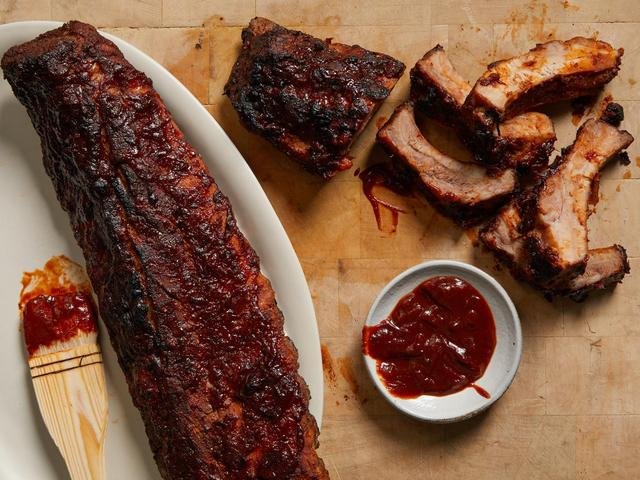
Forget burgers and hot dogs—baby back ribs are easily the star of any summer cookout. They’re versatile, crowd-pleasing, and stick-to-your-bones comforting. From the grill to the slow cooker, there are plenty of ways to make succulent, tender baby back ribs—but which method is the best one?
Frankly, all of them. Yes, cooking baby back ribs can be a labor of love, but they’re one of the most delicious cuts of meat you’ll ever enjoy. If you’re new to this succulent slab of meat, this handy guide to cooking perfect baby back ribs is about to become your new best friend.
From grilling to smoking to baking, we’ll show you five delicious cooking methods for baby back ribs—and we’ll give you an easy recipe with each one. We’ll also explain how to buy and prep a rack of ribs for cooking (including how to remove that pesky membrane). So, without further ado, here's how to make outta-this-world baby back ribs.
What are Baby Back Ribs, Exactly?
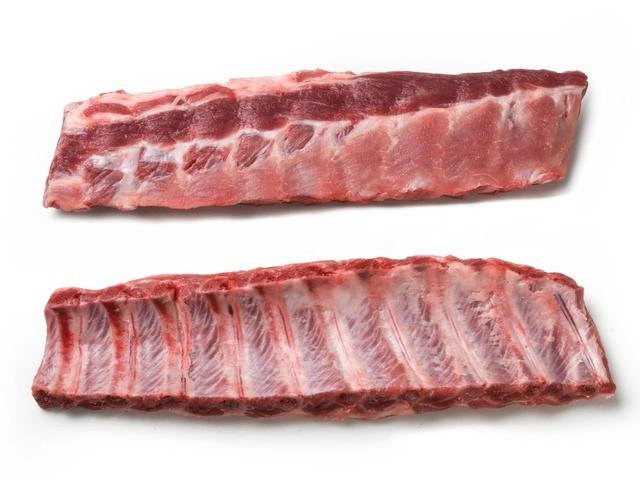
The baby back ribs form the rib bones of the pig closest to the loin, which boasts ultra-tender cuts like the tenderloin. Because of their proximity to the loin, baby back ribs are fall-off-the-bone tender when cooked properly. In fact, if you’ve enjoyed bone-in pork chops—the rib chop specifically—they actually share a portion of the same meat you’ll find on baby back ribs.
One rack of baby back ribs weighs about 3 to 4 pounds and should include 10 to 13 ribs. Depending on how hungry your crowd is, one rack should feed two to three people. Baby back ribs are less expensive than pork chops—and for the amount of meat they provide, the price per pound is a great value.
Baby Back Ribs vs. Spareribs
When shopping for baby back ribs, you may also see pork spareribs (also called St. Louis-style ribs) at the butcher counter. What’s the difference between them? Can you substitute spareribs for baby back ribs in recipes?
The biggest differences between baby back ribs and spareribs are size, cook time, and fat content. Baby back ribs are cut from the top of the ribs, while spareribs are cut from the bottom area. Baby back ribs are leaner and more tender than spareribs, which are fattier and tougher. The last major difference is price—baby back ribs tend to be more expensive than spareribs.
While you can substitute spareribs for baby back ribs, you’ll need to adjust the cook time accordingly. Because spareribs are a larger cut of meat than baby back ribs, they’ll take longer to cook. For example, at the same oven temperature, you can expect spareribs to take up to an hour longer to cook than baby back ribs.
How to Prep Baby Back Ribs
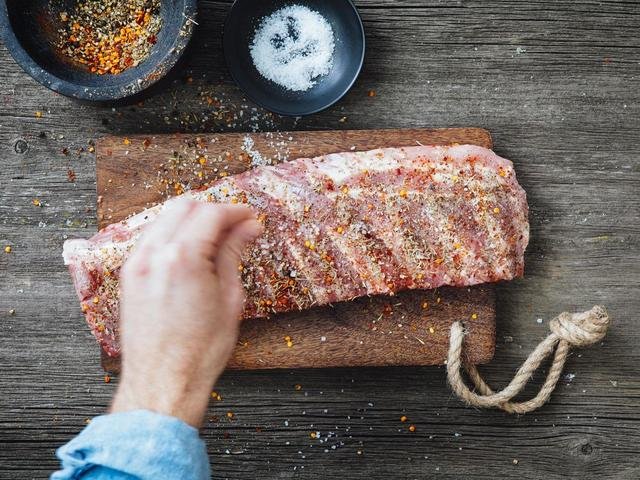
Making baby back ribs can be an all-day affair, so make sure to read your recipe closely before diving in. Decide what tasks need to be done ahead of time, and what can be saved until the day of your cookout or meal. (Trust us—tough ribs and hungry dinner guests is a pretty terrible combo.) Below, find a breakdown of tasks and ingredients you might want to prepare before you start cooking your baby back ribs.
Removing the Membrane
A well-butchered rack of baby back ribs is relatively clean of excess fat—but you’ll want to remove the thin membrane found on the underside before cooking. While the membrane is perfectly edible, removing it will make your ribs more tender and allow them to better absorb a rub or sauce. However, peeling off the membrane can be a bit tricky—and a bit of a pain to be honest. The easiest way to do this is to use a sharp knife to carefully loosen the membrane away from the meat, then pull it away from the bones. The membrane should peel right off, but if you’re having trouble, try gripping it with a paper towel. You can also ask the butcher to take care of this task when you purchase the ribs.
Baby Back Rib Rub
A dry rub is great for larger pieces of meat like baby back ribs—and also brisket, steaks, and pork shoulder. For most cooking methods, dry rubbing the ribs beforehand can give them a big flavor boost. The ingredients in a baby back rib are typically a mix of sugar, salt, spices, and sometimes dried herbs. (Try this basic dry recipe from Southern Living: Smoky Dry Rub.)
Making a baby back rib rub is easy, but make sure you budget enough time for the flavors to fully infuse. Many recipes will call for dry rubbing the ribs the night before. When applying the dry rub, press the mixture into all the nooks and crannies along the ribs—and don’t be afraid to use a little muscle to really work it in.
BBQ Sauce for Ribs
In addition to a dry rub, a tangy barbecue sauce adds balance to the rich, hearty flavor of pork. While using store-bought barbecue sauce is speedy and convenient, homemade barbecue sauce is much easier to make than you’d probably realize. You can make it ahead of time, or knock it out while your ribs cook. Many of the classic ingredients may even be in your kitchen already—like apple cider vinegar, brown sugar, ketchup, and Worcestershire sauce.
How to Cook Baby Back Ribs
If you want to cook perfect baby back ribs, you need one very important thing—time. To go from tough and chewy to luscious and tender, baby back ribs need to be cooked low and slow over indirect heat, whether it’s in the oven or on the grill or smoker. The one exception to this is a pressure cooker or Instant Pot, both of which significantly speed up the process.
How Long to Cook Baby Back Ribs?
How long do baby back ribs need to cook, exactly? The exact cook time for tender baby back ribs depends on the recipe and cooking method. In most cases, ribs can’t be rushed in order to become tender. So if you’re planning to make them for a crowd, allot more time than you think you’ll need.
For traditional methods that use the oven or the grill, budget about 3 to 4 hours of total cook time. For speedier methods like the Instant Pot, ribs can be ready in as little as 25 minutes.
Oven-Baked Baby Back Ribs
Cooking baby back ribs in the oven is one of the easiest ways to make them. For this method, you’ll need a large baking sheet and plenty of tin foil. If you have a wire rack that fits into your baking sheet, we highly recommend using it. Cooking your ribs on a wire rack allows the hot air inside your oven to circulate more evenly around them.
Because you’ll be slow-roasting the ribs first, you’ll want to set your oven to a lower temperature. Depending on the recipe, expect this to be between 325 and 275 degrees. Think of oven-baked ribs as a four step process—bake, baste, bake, broil. First, wrap the ribs in tin foil and bake them until cooked through and tender. Next, remove the foil, and baste the ribs with whatever sauce you’re using, then bake again for just a bit longer. Lastly, flash the ribs underneath the broiler (bone side down) to caramelize the sauce and create a crispier texture.
Want to put this this method to the test? Make our Oven Baby Back Ribs recipe—it’s totally foolproof, plus the homemade barbecue sauce is absolutely killer.
Grilled Baby Back Ribs
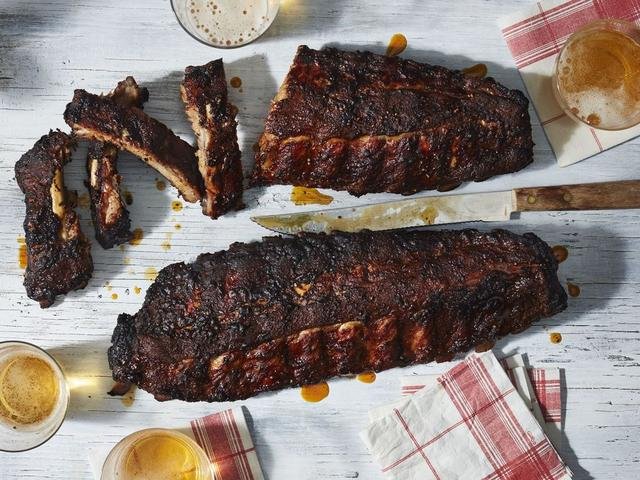
In addition to the oven, grilled baby back ribs are one of the most popular ways to cook them. Cooking your ribs on the grill gives them a smoky flavor and deeply caramelized outer texture—two things that are much more difficult to achieve in an oven.
The key to perfect grilled ribs is cooking them over indirect heat, the coolest area of a hot grill. Indirect heat keeps the ribs juicy on the inside and creates a beautiful crust on the outside. For a gas grill, light one side, but leave the other side unlit—this is where you’ll cook your ribs. If you’re grilling more than one rack, use our clever stacking method, which allows the ribs to self-baste and evenly cook.Master the easy method for grilling baby back ribs by making the easy recipe below. Start with a simple dry rub, then grill the ribs to succulent perfection. Other recipes may call for basting the ribs with barbecue sauce.
Instant Pot Baby Back Ribs
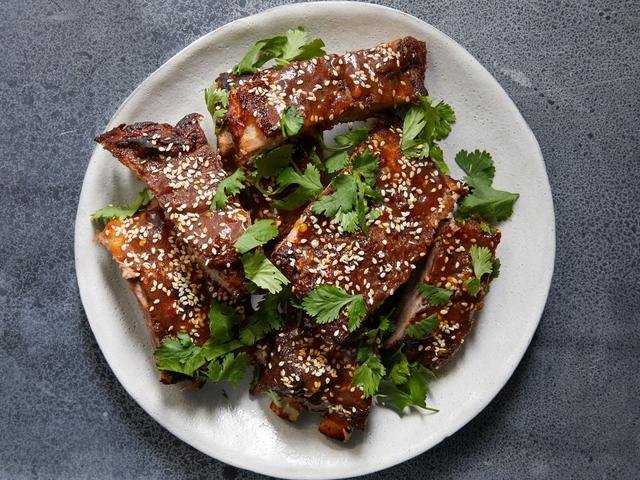
An Instant Pot—the modern day pressure cooker—is a no-fuss method for succulent baby back ribs. Traditional methods for cooking ribs like grilling can take hours, but your Instant Pot can have them ready in well under one hour; thus, succulent ribs can even be an easy weeknight dinner! This foolproof method isn’t just all talk—the resulting ribs are incredibly moist and fall-off-the-bone tender.
While an Instant Pot makes for ultra-tender ribs, you won’t get the caramelized outer crust that you’d get from broiling or grilling. An easy workaround is to brush your ribs with your desired sauce, then broil them for a few minutes just before serving.
If you own an Instant Pot, you’ll want to try the below recipe. We give the classic baby back rib formula an Asian-inspired twist by rubbing the ribs with warming spices like Chinese five spice powder and ground ginger. The spicy-sweet sauce boasts rice vinegar for tang (instead of traditional apple cider vinegar), plus honey and mirin for sweetness, and chili-garlic sauce for a touch of heat.
Slow Cooker Baby Back Ribs
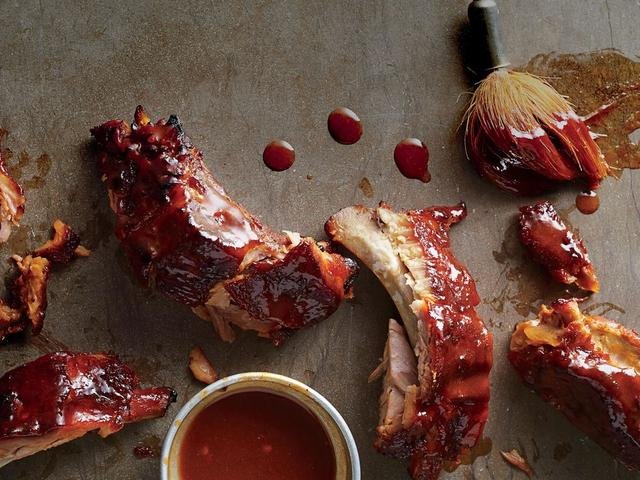
We already love using the slow cooker for making hearty stews, pulled pork, steel-cut oats, and more, but did you know that it’s also great for making baby back ribs? A slow cooker provides an easy, hands-off way to cook mouth-watering baby back ribs—there’s very little technique required, and they’re virtually impossible to screw up. Best of all, you can cook the ribs while you sleep using the LOW setting. Like the Instant Pot method, you’ll want to use the broiler to crisp up the ribs and caramelize the sauce once they’re cooked.
Smoked Baby Back Ribs
Some home cooks may be intimidated by using a smoker—but it's a guaranteed way to add depth and serious flavor to your ribs. Not to mention, you’ll also seriously impress your dinner guests by breaking it out in your backyard.
Don’t own a smoker? Don't fret—you can actually use a basic kettle grill or gas-powered grill to smoke your ribs. Our Ultimate Sweet-Smoky Ribs recipe below is the perfect basic recipe for mastering the technique, whether you own a smoker, charcoal grill, gas grill, or all three. You can swap out the spareribs for baby back ribs, but keep in mind that they will cook faster.
So, you’ve learned how to prep and cook baby back ribs—what are you serving with them? From corn on the cob to coleslaw to potato salad, our Best Summer Sides will complete your perfect cookout menu.
Thnx
Steemlover
that ribs are the greatest